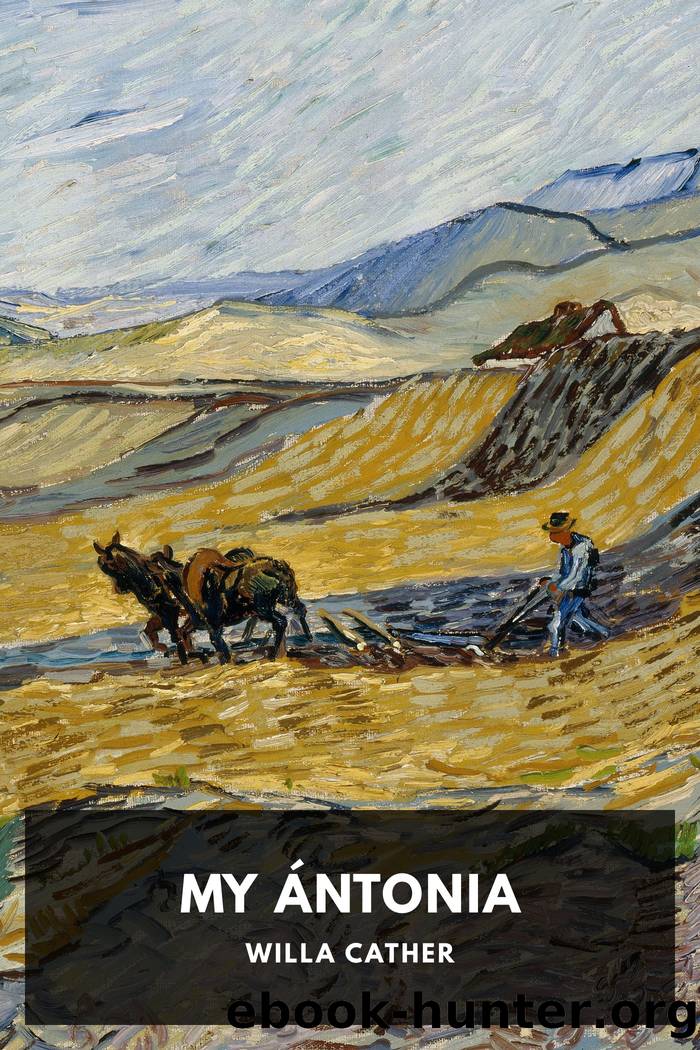My Ãntonia by Willa Cather

Author:Willa Cather [Cather, Willa]
Language: eng
Format: epub, azw3
Tags: Nebraska -- Fiction, Frontier and pioneer life -- Nebraska -- Fiction, Western stories, Domestic fiction, Friendship -- Fiction, Married women -- Fiction, Farm life -- Fiction, Women pioneers -- Fiction, Women immigrants -- Fiction, Farmers’ spouses -- Fiction, Czech Americans -- Fiction
Publisher: Standard Ebooks
Published: 2019-04-01T18:44:12+00:00
VIII
The Harling children and I were never happier, never felt more contented and secure, than in the weeks of spring which broke that long winter. We were out all day in the thin sunshine, helping Mrs. Harling and Tony break the ground and plant the garden, dig around the orchard trees, tie up vines and clip the hedges. Every morning, before I was up, I could hear Tony singing in the garden rows. After the apple and cherry trees broke into bloom, we ran about under them, hunting for the new nests the birds were building, throwing clods at each other, and playing hide-and-seek with Nina. Yet the summer which was to change everything was coming nearer every day. When boys and girls are growing up, life canât stand still, not even in the quietest of country towns; and they have to grow up, whether they will or no. That is what their elders are always forgetting.
It must have been in June, for Mrs. Harling and Ãntonia were preserving cherries, when I stopped one morning to tell them that a dancing pavilion had come to town. I had seen two drays hauling the canvas and painted poles up from the depot.
That afternoon three cheerful-looking Italians strolled about Black Hawk, looking at everything, and with them was a dark, stout woman who wore a long gold watch chain about her neck and carried a black lace parasol. They seemed especially interested in children and vacant lots. When I overtook them and stopped to say a word, I found them affable and confiding. They told me they worked in Kansas City in the winter, and in summer they went out among the farming towns with their tent and taught dancing. When business fell off in one place, they moved on to another.
The dancing pavilion was put up near the Danish laundry, on a vacant lot surrounded by tall, arched cottonwood trees. It was very much like a merry-go-round tent, with open sides and gay flags flying from the poles. Before the week was over, all the ambitious mothers were sending their children to the afternoon dancing class. At three oâclock one met little girls in white dresses and little boys in the round-collared shirts of the time, hurrying along the sidewalk on their way to the tent. Mrs. Vanni received them at the entrance, always dressed in lavender with a great deal of black lace, her important watch chain lying on her bosom. She wore her hair on the top of her head, built up in a black tower, with red coral combs. When she smiled, she showed two rows of strong, crooked yellow teeth. She taught the little children herself, and her husband, the harpist, taught the older ones.
Often the mothers brought their fancywork and sat on the shady side of the tent during the lesson. The popcorn man wheeled his glass wagon under the big cottonwood by the door, and lounged in the sun, sure of a good trade when the dancing was over.
Download
This site does not store any files on its server. We only index and link to content provided by other sites. Please contact the content providers to delete copyright contents if any and email us, we'll remove relevant links or contents immediately.
Cecilia; Or, Memoirs of an Heiress — Volume 3 by Fanny Burney(30934)
Cecilia; Or, Memoirs of an Heiress — Volume 2 by Fanny Burney(30889)
Fanny Burney by Claire Harman(25784)
We're Going to Need More Wine by Gabrielle Union(18074)
Plagued by Fire by Paul Hendrickson(16637)
Cat's cradle by Kurt Vonnegut(13868)
Bombshells: Glamour Girls of a Lifetime by Sullivan Steve(13109)
All the Missing Girls by Megan Miranda(12752)
Leonardo da Vinci by Walter Isaacson(11903)
4 3 2 1: A Novel by Paul Auster(11052)
Adultolescence by Gabbie Hanna(8145)
The remains of the day by Kazuo Ishiguro(7551)
Note to Self by Connor Franta(7024)
Diary of a Player by Brad Paisley(6866)
Giovanni's Room by James Baldwin(5879)
What Does This Button Do? by Bruce Dickinson(5527)
Recovery by Russell Brand(4565)
Born a Crime by Trevor Noah(4511)
The Kite Runner by Khaled Hosseini(4437)
